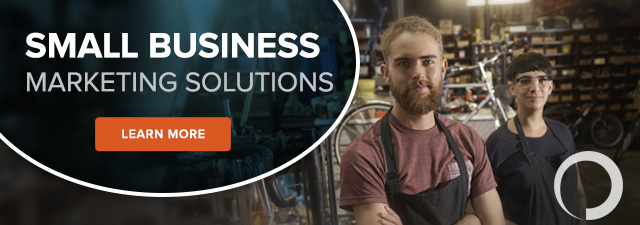
It’s more important than ever for all small businesses to have a strong presence online. Regardless of industry, customers are online all day long, whether it be on their desktop at work, phone on a bus, or tablet at home on the couch.
Representing your business well digitally is easier said than done. Getting found online can be even tougher. But here are some top areas to focus on that will fit a small business’ marketing budget.
1. Have a website
This is obvious but let’s start at the beginning. For nearly all businesses, having a digital storefront in the form of a website is required. It’s about more than just having a site, though.
There is a lot that goes into making a website high quality. Many of the next thirteen points dive into some of those parts, but to start, make sure your website has a strong domain name.
2. Clearly explain who you are and what you do on your website
This may seem obvious too but I run into websites with this issue more than you’d think. When a user/customer arrives at your site, it should be clear to them who and what you are. Don’t expect them to use common sense. Not all potential paying customers do.
3. Optimize for search engines (SEO)
The last point was for people. This one is for machines. Your website needs to be optimized for search engines so they can find you and list you in their search results pages. Search engine optimization is a full-time, ongoing effort but there are usually some things you can do for quick wins to help search engines better understand what your site is about.
4. Have a call to action
Depending on your business, it’s very likely your site is not meant to be purely informative. At the end of the day, you want customers to take an action. Fill out a form, give you a call, come into your store, etc. If that’s the case, don’t be coy. Be clear with solid call(s) to action.
Lead your users down a path to the conversion you’re looking for. Again, this goes back to common sense. Don’t expect everyone to use it. Also, people online have short attention spans so don’t make them go looking for the very thing you brought them there to do.
5. Produce quality content
Content for the sake of content will not get you far. Content can mean many things. It can be text, videos, blog posts. Really, content is anything and everything a user encounters when visiting your site. Make sure the content people are consuming is worthwhile. High-quality content is both useful and informative.
6. Have a mobile friendly site
Every year, more and more people are shifting their online time toward mobile devices. Make sure your site is mobile friendly. Hop on your phone and take a look at how your site is rendered. Is your site responsive? It should be. Not only will having a mobile-friendly site make your site easier for users to consume, it will also allow you to rank better on Google. Google looks at mobile-friendliness as a ranking factor.
Not sure if your site is mobile friendly? Google made a tool that will let you know if it is, so put your site in and find out.
7. Install Google Analytics
Install Google Analytics on your website. GA is a very powerful, free tool that will allow you to understand how people are interacting with your site. It can tell you things like how people are reaching your site, how many people visit your site, when they visit, for how long, and so much more. If you are an eCommerce business you can install eCommerce tracking too that will allow you to track sales and revenue.
This is a true example of Knowledge Is Power. Give yourself the data and insight you need to improve your site and marketing efforts.
8. Have a social media presence
Start with Facebook but depending on your business, getting set up on Twitter, LinkedIn, Pinterest etc. is a great way to increase visibility and help you engage with your audience.
Don’t stop at just having a Facebook page, though. You should be putting out content on a regular basis and checking in regularly.
9. Paid social
Getting found online isn’t easy. Luckily for you (and Google’s bank account), there is a way to buy yourself some visibility. PPC (pay-per-click) advertising is a quick way to make sure your site comes up in the search results for the key search queries.
Google AdWords is a great place to start. The only road block here is that you have to continue to pay Google to maintain your spot in the rankings, but it’s becoming more and more of a necessity as competition for ranking continues to grow.
10. Optimize your local listings (Local SEO)
If you’re a local business, local SEO is a very big win opportunity. Getting yourself set up on directories like Yelp, Google My Business, and Bing Places for Business will help people find you with relative ease.
11. Put testimonials on your site
Have testimonials, reviews, and/or case studies on your site. People shopping around are skeptical and have short attention spans. You need to earn their trust quickly. Testimonials are a great way to show them that you’re legitimate and that you can be trusted to deliver high-quality products or services.
12. Have a blog
We already mentioned quality content, but having a regularly-updated blog is a good way to facilitate that. Blog posts allow you to share your knowledge and help show people that you know what you’re talking about. Also, blog content will help your rank on search engines.
13. Do email marketing
You’re probably already collecting email addresses in some way. If you aren’t, find a way to start (during checkout, as a form on the site, etc.). Once you have an email list built and growing, you can use it to start an email marketing campaign as a way to re-engage past customers or to help bring people back who are still in the market.
Operating an online small business isn’t as easy as 13 quick points, but hopefully, you’ll find a few new ideas you’re missing out on. Let me know what I am missing in the comments.

The post 13 Digital Priorities for Small Businesses appeared first on Portent.
// // from Portent https://www.portent.com/blog/internet-marketing/13-priorities-online-small-business.htm
0 comments:
Post a Comment